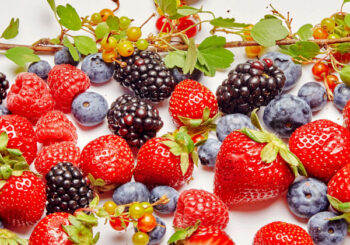By Sayer Ji
Contributing writer for Wake Up World
Important work presentation on the schedule? Big exam coming up? During an ordinary day, your brain performance will gradually decrease as you become cognitively fatigued, possibly leaving you in a fog the moment you need your brain to be at its best.
Nature comes to the rescue once again, however, as snacking on a tasty berry snack may be all you need to boost your brain function — and ace your upcoming task.
Berries are just one of at least 255 natural brain-boosting substances that may ward off cognitive decline, as featured in GreenMedInfo.com’s cognitive decline/dysfunction database. But, as a “particularly rich source” of flavonoids called anthocyanidins, berries deserve special mention.[i]
Eating Berries Boosts Cognitive Function for Six Hours
Previous research has shown berries improve executive function, which includes working memory and self-control, along with positive affect, a measure of positive moods, such as joy and enthusiasm, within 20 minutes to two hours after consumption.[ii] Researchers with the U.K.’s University of Reading looked into berries’ affects over a working day, defined as a six-hour period.
Forty people between the ages of 20 and 30 consumed a 400-milliliter (approximately 1.7-cup) smoothie made with equal amounts of blueberries, strawberries, raspberries and blackberries or a placebo. Testing of mood, via positive and negative affect, and executive function occurred two, four and six hours after consumption.
Among the placebo group, cognitive performance decreased throughout the day. But this wasn’t the case among the berry group. Those who consumed the berry smoothie maintained accuracy on cognitive tasks and had quicker response times for executive functions after two and four hours.
They also performed faster on task-switching tasks after six hours. “This study demonstrates the efficacy of flavonoid rich berries in maintaining or improving cognitive performance across the 6 h[our] day,” the researchers noted, adding, “The cognitive effects are particularly evident during periods of cognitive compromise where the individual is fatigued and task demand is high.”[iii]
Why Berries Make a Perfect Snack
It was particularly impressive that participants not only maintained accuracy but also improved response times at the six-hour mark, which “took place at 15:00 h during the known post lunch dip in cognitive performance and also nearing the end of the working day when participants would be most cognitively fatigued.”[iv]
This means snacking on berries in the morning could help you power through a particularly mentally trying day. It’s possible the flavonoid-rich berries led to improved cognitive performance by enhancing cerebrovascular blood flow and mediating cell signaling pathways.[v] The study used 300 grams of berries, or about 1.27 cups.
Children can also benefit from snacking on berries. Two hours after drinking a blueberry beverage, children between the ages of 8 and 10 performed better on a word recall test in one study.[vi]
Red Berries Boost Neurocognition in Adults
Berries aren’t only useful for boosting brain power for a matter of hours. Longer term consumption also benefits the brain, according to a study of 50- to 75-year-old adults.[vii] Those who consumed an anthocyanin-rich red berry mixture, a flavanol-rich cocoa powder or a combination of both for 12 weeks scored better on a neurocognitive test, suggesting an improvement in executive function.
Flavonoids, including anthocyanins, are known for their .. They not only protect neurons but may stimulate neuronal regeneration, along with increasing protective signaling and decreasing oxidative and inflammatory stress.
Flavonoids may even promote the synthesis of new protein in neurons, inducing changes that influence memory acquisition and consolidation.[viii] Beyond this, they offer benefits to metabolic function that may further support brain health. According to the study:[ix]
“One should take into consideration that flavanols and anthocyanins not only directly affect neurons, as multiple studies have shown in the past, but that the consumption of foods rich in flavonoids improves the glucoregulatory control via improved insulin sensitivity and cerebral blood flow by increasing the bioavailability of nitric oxide, resulting in improved cognitive performance.”
Berries Benefit 400+ Diseases
In terms of foods to bolster brain function, berries are key. But it’s not only your brain that benefits when you eat berries. We’ve compiled 400+ diseases that berries benefit, which include:
| High blood pressure | Obesity | Cardiovascular diseases |
| Urinary tract infections | Type 2 diabetes | Metabolic syndrome |
| Cancer | Osteoarthritis | Depression |
| Influenza | Macular degeneration | Psoriasis |
| Gingivitis | Parkinson’s disease | Stroke |
In addition to powerful anti-inflammatory and antioxidant properties, berries are also antibacterial, antihypertensive, cardioprotective and hepatoprotective (liver protective) agents — and that’s just a small sampling of their 154 pharmacological actions.
If you’re wondering how many berries you need to eat to gain their full effects, eating about one cup a day has been linked to measurable improvements in heart health,[x] while the featured study also used an amount just over 1 cup — so that may be a good starting point.
Different berries appear to provide varying advantages. For instance, polyphenols in blueberries may affect microflora in your gastrointestinal tract,[xi] while strawberries help prevent disorders related to inflammation and obesity.[xii] It’s possible the best option is to eat a wide variety of berries, ideally organic and in-season, daily. You can read about individual berries in detail here:
| Blueberries | Bilberry | Black Currant |
| Blueberry | Cranberry | Mulberry |
| Raspberry | Strawberry | Maqui |
| Goji Berry | Chokeberry | Lingonberry |
| Blackberries |
References:
[i] Nutrients. 2019 Nov; 11(11): 2685. https://www.ncbi.nlm.nih.gov/pmc/articles/PMC6893475/
[ii] Nutrients. 2019 Nov; 11(11): 2685. https://www.ncbi.nlm.nih.gov/pmc/articles/PMC6893475/
[iii] Nutrients. 2019 Nov; 11(11): 2685. https://www.ncbi.nlm.nih.gov/pmc/articles/PMC6893475/
[iv] Nutrients. 2019 Nov; 11(11): 2685. https://www.ncbi.nlm.nih.gov/pmc/articles/PMC6893475/
[v] Nutrients. 2019 Nov; 11(11): 2685. https://www.ncbi.nlm.nih.gov/pmc/articles/PMC6893475/
[vi] Nutrition March 2015, Volume 31, Issue 3, Pages 531-534 https://www.sciencedirect.com/science/article/abs/pii/S0899900714004353?via%3Dihub
[vii] Nutrients. 2022 Jan; 14(1): 1. https://www.ncbi.nlm.nih.gov/pmc/articles/PMC8746322/
[viii] Nutrients. 2022 Jan; 14(1): 1. https://www.ncbi.nlm.nih.gov/pmc/articles/PMC8746322/
[ix] Nutrients. 2022 Jan; 14(1): 1. https://www.ncbi.nlm.nih.gov/pmc/articles/PMC8746322/
[x] The American Journal of Clinical Nutrition June 2019, Volume 109, Issue 6 https://academic.oup.com/ajcn/article/109/6/1535/5499342
[xi] Adv Nutr. 2020 Mar; 11(2): 224-236. https://www.ncbi.nlm.nih.gov/pmc/articles/PMC7442370/
[xii] J. Agric. Food Chem. 2016, 64, 22, 4435-4449 https://pubs.acs.org/doi/10.1021/acs.jafc.6b00857
About the author:
Sayer Ji is the founder of Greenmedinfo.com, a reviewer at the International Journal of Human Nutrition and Functional Medicine, Co-founder and CEO of Systome Biomed, Vice Chairman of the Board of the National Health Federation, and Steering Committee Member of the Global Non-GMO Foundation.
© 2020 GreenMedInfo LLC. This work is reproduced and distributed with the permission of GreenMedInfo LLC. Want to learn more from GreenMedInfo? Sign up for their newsletter here.

If you've found value in our articles, we invite you to support the release of our brand-new book, "Gratitude Practices for Kids: A Practical Guide for Adults to Instill a Spirit of Appreciation and Positivity in the Next Generation."
"Gratitude Practices for Kids" brings together over 25 innovative and accessible practices designed to enhance gratitude in everyday life. This comprehensive guide is backed by 17 scientific studies, ensuring each concept is grounded in research, underscoring our commitment to nurturing growth, emotional intelligence, and positive interactions between adults and children.
We encourage you to opt for the paperback version to celebrate this new release. Dive into its fresh pages away from digital distractions, allowing you to immerse yourself in the transformative practices it offers.
Over recent years, Wake Up World has faced significant online censorship, which has impacted our financial ability to operate. Moving into book publishing represents a strategic step to secure the ongoing funds needed to continue our mission. By purchasing Gratitude for Kids, you help us keep our content free and accessible to everyone, avoiding needing a paywall. With over 8,500 articles published in the last 13 years, we remain dedicated to keeping our valuable content open to all.










